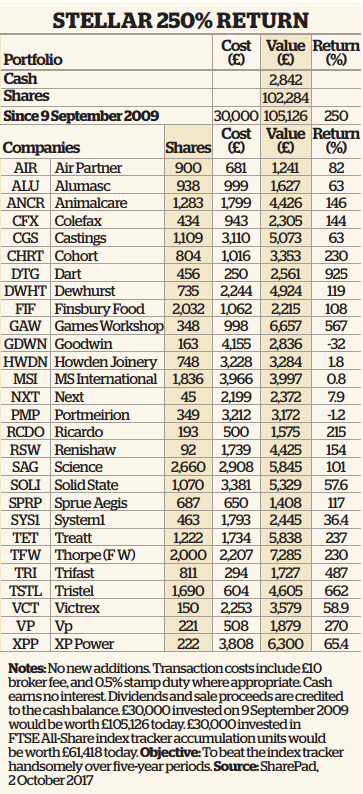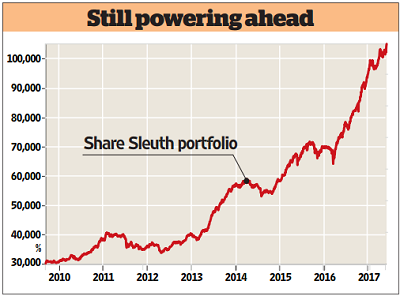Should investors avoid shares on the acquisition trail?
3rd November 2017 10:11
by Richard Beddard from interactive investor
Share on
Portfolio favourite is going down the acquisition trail, a strategy that usually gives me the heebie-jeebies.
Maybe it's different this time. Until now, the supplier of power converters (aka power supplies, or power adapters) has grown bigger and more much more profitable by improving itself.
Originally a distributor, it used knowledge gleaned from customers and manufacturers of industrial and healthcare equipment to design smaller, more efficient and reliable converters that fit more easily into their products, and it built factories to manufacture them.
These aren't the generic adapters you plug into your phone or laptop. If XP's converters fail, production lines could stop or medical procedures could be interrupted. So customers pay well - for the right product.
Acquisitions, though, are often regarded by investors as a quick, expensive and risky strategy.
A company doesn't have to be inventive, it can just buy another firm's inventiveness. Nonetheless, the signs are that acquisitions will become a more important part of XP's future.
In 2015, XP augmented its range of AC-DC converters by acquiring EMCO, a supplier of DC to high-voltage DC converters.
In November this year, XP chief financial officer Jonathan Rhodes is standing down to make way for an external appointment.
The company's announcement in September emphasised his replacement's experience in a number of acquisitive businesses.
Early in October, XP acquired Comdel, a US firm that manufactures radio frequency (RF) power supplies.
RF power supplies produce the very high frequencies required to control plasma used in industrial processes, for example the manufacture of microprocessors.
Prior to the acquisition of Comdel, XP had no capability in RF power.
Like the previous acquisition EMCO, Comdel gives XP more products to sell to some of its biggest customers, one of its strategic objectives, and also the opportunity to sell its AC-DC and DC-DC power converters to those Comdel customers it doesn't already deal with.

Comdel's power supplies are made in America so, over time, there may be an opportunity for XP to reduce manufacturing costs by sourcing components from Asia.
XP owns factories in China and Vietnam, and also sources components and power supplies from Asian distributors and manufacturers.
On the face of it, this seems like a good acquisition.
XP doesn't have a capability in RF, but it has a global sales and support network and existing customers to sell to. Comdel is relatively small: in its most recent financial year revenue was £13 million and pre-tax profit was £1.4 million.
In comparison, XP earned 10 times as much revenue and 20 times as much profit. But I prefer evolution to revolution and I get concerned when a deal is billed as 'transformational'. Companies like XP don't need transforming.
Moreover, Comdel isn't an obvious bargain. XP paid £17 million, about 12 times pre-tax profit, so the combination of the two companies needs to add up to more than the sum of their parts if it's to make XP a significantly better investment.
Though I think it will, I can't be sure of this.
Historically, demand from semiconductor equipment manufacturers has been more volatile than demand from XP's other industrial customers.
Semiconductor manufacturers buy machinery as they gear up for the launch of big new consumer electronic products, for example - but once they're tooled up, demand subsides.
Last year was a good year and XP's revenues from the sector surged. While the rise of the electric vehicle is also spurring demand, it can't be taken for granted.
Nevertheless, I trust XP, and based on the little I've learned about Comdel, I like it too. It's certainly a survivor, founded over 50 years ago, its website still lists its founder as chief technology officer. I don't know if he's staying on, but Comdel's chief executive is, and so is Rhodes, XP's outgoing chief financial officer. That may say something about XP too.

These articles are provided for information purposes only. Occasionally, an opinion about whether to buy or sell a specific investment may be provided by third parties. The content is not intended to be a personal recommendation to buy or sell any financial instrument or product, or to adopt any investment strategy as it is not provided based on an assessment of your investing knowledge and experience, your financial situation or your investment objectives. The value of your investments, and the income derived from them, may go down as well as up. You may not get back all the money that you invest. The investments referred to in this article may not be suitable for all investors, and if in doubt, an investor should seek advice from a qualified investment adviser.
Full performance can be found on the company or index summary page on the interactive investor website. Simply click on the company's or index name highlighted in the article.
Disclosure
We use a combination of fundamental and technical analysis in forming our view as to the valuation and prospects of an investment. Where relevant we have set out those particular matters we think are important in the above article, but further detail can be found here.
Please note that our article on this investment should not be considered to be a regular publication.
Details of all recommendations issued by ii during the previous 12-month period can be found here.
ii adheres to a strict code of conduct. Contributors may hold shares or have other interests in companies included in these portfolios, which could create a conflict of interests. Contributors intending to write about any financial instruments in which they have an interest are required to disclose such interest to ii and in the article itself. ii will at all times consider whether such interest impairs the objectivity of the recommendation.
In addition, individuals involved in the production of investment articles are subject to a personal account dealing restriction, which prevents them from placing a transaction in the specified instrument(s) for a period before and for five working days after such publication. This is to avoid personal interests conflicting with the interests of the recipients of those investment articles.
This article was originally published in our sister magazine Money Observer, which ceased publication in August 2020.
These articles are provided for information purposes only. Occasionally, an opinion about whether to buy or sell a specific investment may be provided by third parties. The content is not intended to be a personal recommendation to buy or sell any financial instrument or product, or to adopt any investment strategy as it is not provided based on an assessment of your investing knowledge and experience, your financial situation or your investment objectives. The value of your investments, and the income derived from them, may go down as well as up. You may not get back all the money that you invest. The investments referred to in this article may not be suitable for all investors, and if in doubt, an investor should seek advice from a qualified investment adviser.
Full performance can be found on the company or index summary page on the interactive investor website. Simply click on the company's or index name highlighted in the article.